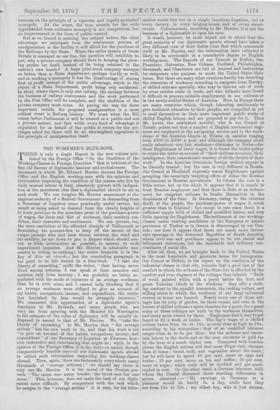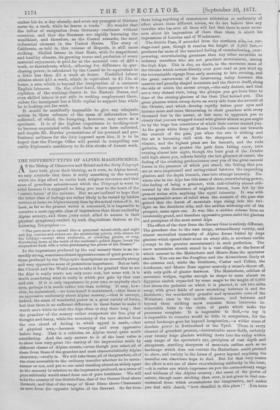THE WORKMEN'S BLUE-BOOK.
THERE is only a single Report in the new volume pub- lished by the Foreign Office " On the Condition of the Working-Classes in Foreign Countries " that is redolent of the fine old flavour of diplomatic hauteur and exclusiveness. The document in which Mr. Edward }lorries favours the Foreign Office and the English working-men with his opinions and information respecting the condition of the masses who live by daily manual labour in Italy, absolutely quivers with indigna- tion at the monstrous idea that a diplomatist should be set to such work. We can imagine Mr. Harries' amazement at the impious audacity of a Radical Government in demanding from a Secretary of Legation some practically useful service, his wrath at being asked to descend from the cloudy heights of l( haute politique to the mundane prose of the purchase-power of wages, the dress and diet of workmen, their sanitary con- dition, their character and sentiments. We can picture, too, the stern resolution of the offended disciple of Talleyrand, as flourishing his pounoet-box to keep off the savour of the vulgar persons who had been thrust between the wind and his nobility, he sat down to pen a Report which should con- vey as little information as possible, in answer to such impertinent inquiries. And Mr. Herries is admirably suc- cessful in telling us nothing ; the entire despatch is in the key of Non ml rioordo ; but the concluding paragraph is too good to be left buried in a blue-book. " I take the liberty of remarking," sniffs the writer, " that having never lived among artizans, I can speak of their manners and customs only from hearsay ; I am probably no better ac- quainted with the mode of existence of an average workman than he is with mine, and I cannot help thinking that if an average workman were obliged to give an account of my habits, occupations, income, and expenditure, the statis- tics furnished by him would be strangely incorrect." We commend this appreciation of a diplomatic agent's functions to Mr. Rylands, and many people who are very far from agreeing with the Member for Warrington in his estimate of the value of diplomacy will be equally in- disposed to assent to that of Mr. Herries, We " take the liberty of remarking " to Mr. Herries that " the average artizan " has his own work to do, and that his work is not "to give an account of the habits, occupations, income, and expenditure " of our Secretary of Legation at Florence, how- ever instructive and entertaining that might be ; while, in the opinion of the Foreign Office, it is the duty—a useful, though comparatively humble one—of our diplomatic agents abroad to collect such information respecting the working-classes abroad. Then, again, there are fortunately everywhere many thousands of "average artizans ; " we should say there is only one Mr. Herries. It is the moral of the Persian pro- verb, " The moon sees many brooks ; the brook sees but one moon." This, however, does not make the task of our diplo- matist more difficult. By comparison with the task which he assigns to the " average artisan " it is easy, for his infer
motion meets him not in a single luxurious Legation, but in every factory, in every lodging-house, and at every street- corner. Unfortunately, according to Mr. lorries, it is not the business of a diplomatist to open his eyes.
It would, however, be most unjust not to admit that the great majority of our diplomatic agents abroad have taken a very different view of their duties from that which commends itself to Mr. Herries, and the information here collected is likely to be serviceable in a remarkable degree to English working-men. The Reports of our Consuls at Buffalo, San Francisco, Galveston, New Orleans, Portland, Philadelphia, Savannah, and Charleston are full of interest and instruction for emigrants who purpose to make the United States their home. But there are many other countries hardly less deserving. the attention of workmen intending to emigrate from Europe, of skilled artizans specially, who may be thrown out of work by some sudden crisis in trade, and who hitherto have found it difficult to procure suitable employment in our colonies or in the newly-settled States of America. Now, in Europe there are many countries which, though labouring assiduously to give technical education to their peoples, are compelled as yet to avail themselves in their more important public works of skilled English labour, and are prepared to pay for it. Thus Mr. Lever, the celebrated novelist, who is our Consul at. Trieste, points out that a numher of. English mechanical engi- neers are employed in the navigating service and in the work- shops of the Austrian Lloyds at Trieste on salaries ranging from £200 to £300 a year, and although the company could easily substitute very fair workmen—Germans or Swiss—for these Englishmen at lower wages, it is found the better policy to retain the latter on account of "their uniform accuracy, their intelligence, their consummate mastery of all the details of their work." In the Austrian dominions foreign settlers appear to be liberally treated ; but the case is very different in Russia. Our Consul at Nicolaieff expressly warns Englishmen against accepting the seemingly tempting offers of either the Russian Government or Russian speculators. In Odessa the case is a little better, but all the whole it appears that it is unsafe to trust Russian employers, and that there is little or no induce- ment for emigrant artisans to betake themselves to the dominions of the Czar. In Germany, owing to the extreme• thrift of the people, the purchase-power of wages is much greater than in England ; but except in rare cases there is a sufficient supply both of skilled and unskilled labour, and very little opening for Englishmen. The settlement of our working- classes under existing conditions in the European or Asiatic provinces of Turkey or in Greece is discouraged by our Con- suls ; nor does it appear that there are much more favour- able openings in the disturbed Republics of South America, where civil war and pestilence appear to be not casual and infrequent visitations, but the inevitable and ordinary con- comitants of social life.
After all, then, we are brought back to the United States as the most hospitable and generous home for immigrants. Our Consul at Buffalo, in his report on the condition of the industrial classes in that city, remarks that a good test of the comfort in which the artizans of the State live is afforded by the comfort and even elegance of the cottages they inhabit. " Built of wood, painted white, with a porch before the door, and green Venetian blinds to the windows," they offer a strik- ing contrast to the squalid tenements, the reeking cellars, and stifling attics in which the workmen of our large industrial centres at home are housed. Nearly every one of these cot- tages has its strip of garden, its three rooms, and even in the houses of skilled artizans a spare chamber for a guest, for a great many of these cottages are built by the workmen themselves, and many more owned by them. Single men find it easy to get board at £1 a week, or under. The day's wage of a skilled artizan varies from Gs. to 16s,, or even rises as high as 24s,, according to his occupation ; that of an unskilled labourer ranges from 4s. to fis. per diem ; but the arduous and uncer- tain labour in the docks and at the corn elevators is paid for by the hour at a much higher rate. Compared with London prices, the English artisan will find meat 20 per cent. cheaper than at home ; bread, milk, and vegetables about the same ; but he will have to spend 40 per cent. more on eggs and butter ; 25 per cent. more on tea and coffee ; 50 per cent. more on sugar ; while coals will be doubled and gas quad- rupled in cost. On the other hand, a German labourer, with whom the Consul discussed these startling differences in prices, observed : — " My earnings in Germany as a plasterer would be barely 3s. a day, while here they are from lls, to 12s, ; my eldest boy, who is just sixteen,
makes his 4s. a day already, and even my youngest of thirteen earns 8s. a week, while he learns a trade." No wonder that the influx of emigration from Germany continues without cessation, and that the Germans are rapidly becoming the wealthiest, and therefore, as the Consul remarks, the most
influential element in the United States. The story of California, as told in this volume of Reports, is still more striking. Skilled labour in that State, with its magnificent and healthy climate, its growing towns and profusion of every material enjoyment, is paid for at the nominal rate of $20 a week, or thereabouts, which, allowing for difference in pun- chasing power, is calculated by the Consul to be equivalent to a little less than £3 a week at home. Unskilled labour obtains about $11 a week, which is equivalent to £1 13s. at home, a sum which, is beyond the imagination of a common English labourer. On the other hand, there appears to be a repletion of the working-classes in the Eastern States, and even skilled labour is not safe in seeking employment there, unless the immigrant has a little capital to support him while he is looking out for work.
It would be manifestly impossible to give any adequate notion in these columns of the mass of information here collected, of which the foregoing, however, may serve as a specimen. It is of the highest importance to working-men to become acquainted with such facts as are here collected, and despite Mr. Herries' protestations of his personal and pro- fessional unfitness for the duty imposed upon him, it is to be hoped that the Foreign Office will persist in compelling our costly Diplomatic machinery to do this stroke of honest work.































 Previous page
Previous page